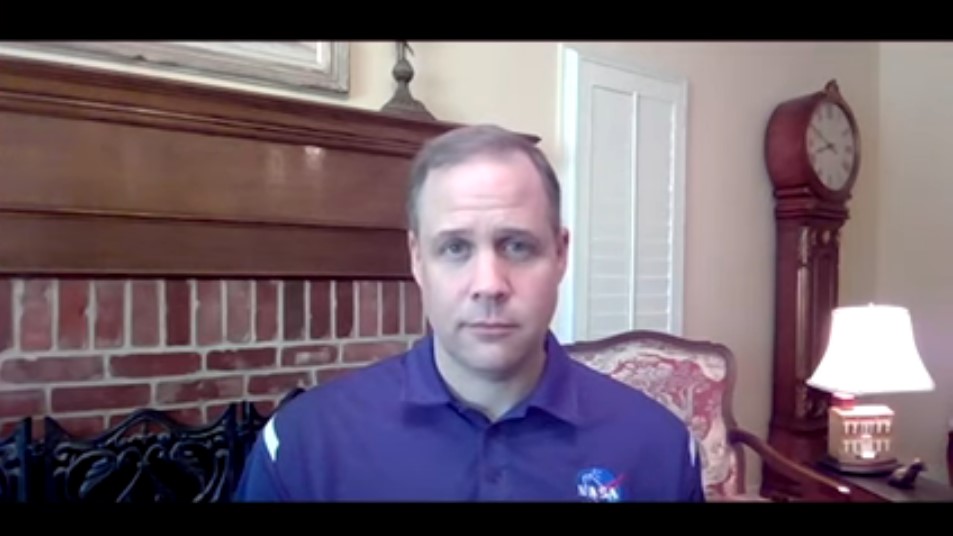NASA weighs measures to contribute to US coronavirus pandemic fight
NASA's response so far to the COVID-19 pandemic has focused on switching to remote work as the virus spreads, but the agency is evaluating other methods to address the unprecedented public health crisis as well, including new ways to contribute to the larger U.S. response.
Those measures include finding ways to support employees caring for dependents and partnering with other government agencies to help medical personnel caring for patients. But NASA's top priority during the coronavirus pandemic is the safety of its employees, agency head Jim Bridenstine emphasized during a digital town hall held yesterday (March 25).
"Our number-one highest priority as an agency is your health and your safety, and we don't want to ask you to do anything that you feel is unsafe," Bridenstine said during the event. "If you think something is unsafe, don't do it," he reiterated. "Your safety is my highest priority, and you've got my commitment to continue defending your decisions."
Related: Live updates about the coronavirus pandemic
Updates: The coronavirus pandemic impacts on space exploration

NASA leadership also told staff to expect missions already in flight to remain in their normal state through the pandemic and pointed to the fact that many operate mostly autonomously as a matter of course. "We're going to continue to operate those," Associate Administrator Steve Jurczyk said.
Citing the European Space Agency's decision to switch four missions to a safe holding mode with completely autonomous operations, Jurczyk said that, at least for now, NASA will not be following suit. "We're looking at that possibly if things deteriorate further, but we're going to maintain all our missions in space in mostly normal operations for now," he said.
The bulk of the town hall focused on answering questions NASA personnel had submitted about the continuing crisis and the agency's response to it. In particular, staff asked leadership about how the agency was evaluating ways it could put its resources to use — whether it was considering finding ways to manufacture ventilators or donate protective equipment, for example.
Get the Space.com Newsletter
Breaking space news, the latest updates on rocket launches, skywatching events and more!
Related: Coronavirus prevention measures take their toll on astronomy
Bridenstine and James D. Polk, NASA's Chief Health and Medical Officer, said that the agency was indeed studying potential contributions but was not yet ready to announce any measures.
In part, Polk said, NASA is waiting for a cross-government meeting scheduled for today (March 26) meant to work out how agencies can most effectively collaborate. He said he expected topics like whether NASA could support ventilator production to be discussed during that conversation.
"This is on the minds of a lot of people at the agency," Bridenstine said. "NASA is involved in providing solution sets for the nation, and we will be more and more involved as the days go on, because we do have an extremely talented and very bright workforce and a lot of capabilities that can help."

Donating personal protective equipment from cleanrooms and other NASA facilities is complicated, Polk said, because the agency orders these items on a just-in-time schedule. "We don't have a massive stockpile of PPE to donate," he said of these items, including masks and gloves.
Some mission-critical work that is continuing also requires this equipment, and supply shortages have required NASA centers to send materials to each other. He also pointed to concerns about getting the right equipment to the right people through the right channels. "We're looking into that right now," Polk said.
Bridenstine highlighted NASA's Ames Research Center in California for its initiative in looking for ways to contribute to the pandemic response. The center has worked to donate supercomputer resources to researchers looking for treatments and vaccines for the new coronavirus and also worked with the state's National Guard to make space available for medical care outposts.
The other major topic addressed during the town hall was how NASA is meeting the needs of its own employees during this time of upheaval. Questions addressed concerns like how staff could take time to care for dependents, whether contractors would be paid throughout the crisis and how the transition to working remotely might affect NASA in the long term.
Throughout the conversation, NASA leadership emphasized that the agency's priorities were focused on employee health, the safety of critical missions and flexibility during uncertain times. They also expressed confidence in the measures the agency has enacted so far, even when those measures have seemed premature. "Every time we've made a decision and we've felt like maybe we're leaning too far forward, the world catches up to us very quickly and it turns out to be a good decision," Polk said.
While the conversation focused on NASA's tactics for surviving the pandemic, Bridenstine was careful to note that he believes that the crisis will eventually be resolved. "Let's not get caught up in these times that seem dark; let's start thinking about what the future looks like," he said. "We need to make sure that we're thinking about a future that is bright. We need to think about a future where NASA is doing stunning achievements that inspire not just the nation but the world."
Watch the full virtual town hall meeting with NASA chief Jim Bridenstine here.
- Getting sick in space: How would NASA handle an astronaut disease outbreak?
- Dramatic effect of coronavirus lockdowns seen from space
- NASA center in California issues mandatory work-from-home order after employee tests positive for coronavirus
Email Meghan Bartels at mbartels@space.com or follow her @meghanbartels. Follow us on Twitter @Spacedotcom and on Facebook.
OFFER: Save at least 56% with our latest magazine deal!
All About Space magazine takes you on an awe-inspiring journey through our solar system and beyond, from the amazing technology and spacecraft that enables humanity to venture into orbit, to the complexities of space science.
Join our Space Forums to keep talking space on the latest missions, night sky and more! And if you have a news tip, correction or comment, let us know at: community@space.com.

Meghan is a senior writer at Space.com and has more than five years' experience as a science journalist based in New York City. She joined Space.com in July 2018, with previous writing published in outlets including Newsweek and Audubon. Meghan earned an MA in science journalism from New York University and a BA in classics from Georgetown University, and in her free time she enjoys reading and visiting museums. Follow her on Twitter at @meghanbartels.










